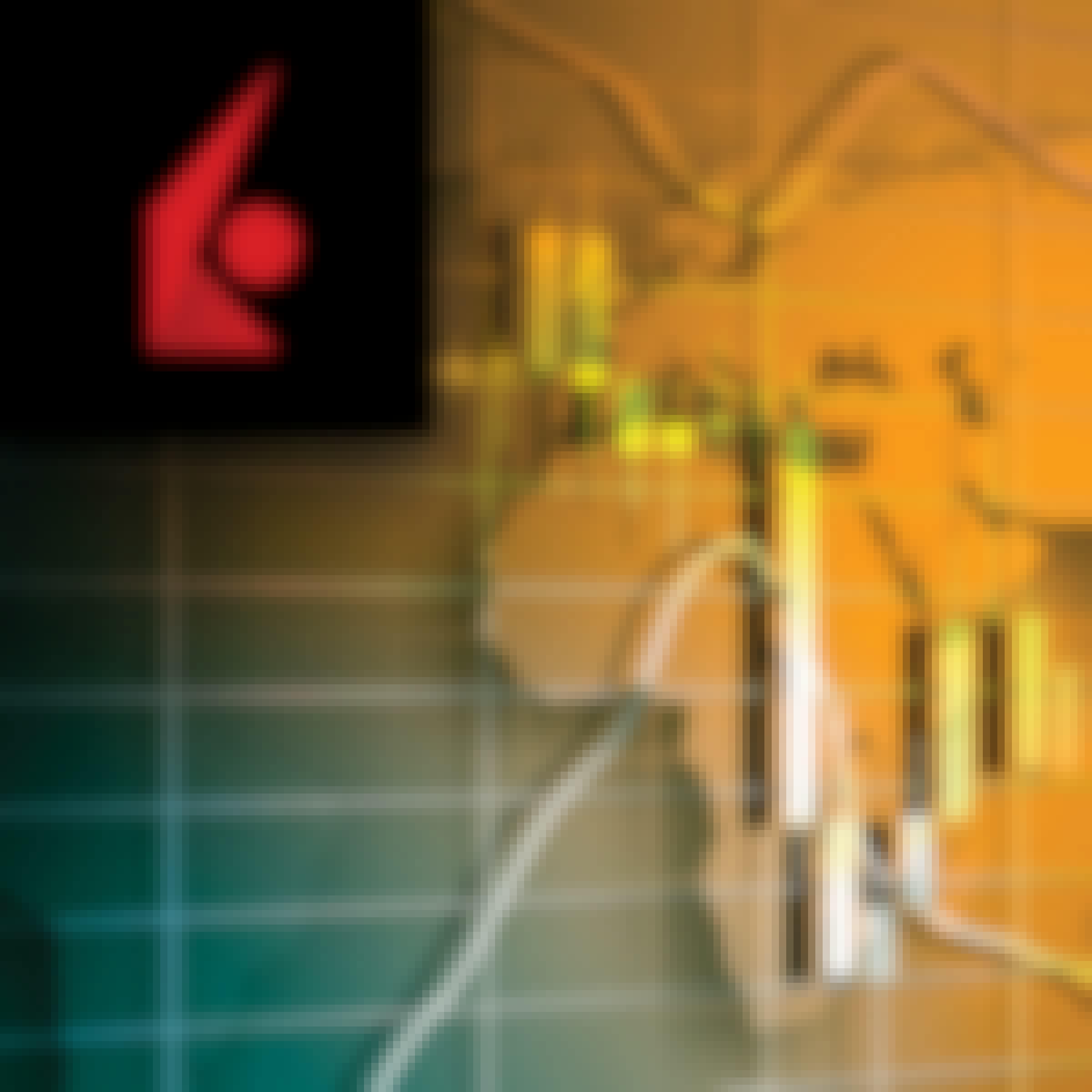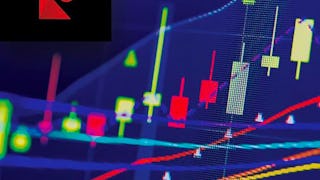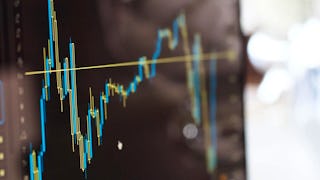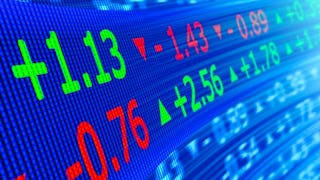- Browse
- Forex
Forex Courses
Forex courses can help you learn currency trading strategies, technical analysis, risk management, and market trends. You can build skills in chart reading, executing trades, and analyzing economic indicators. Many courses introduce tools like trading platforms, charting software, and economic calendars, that support tracking market movements and making informed trading decisions.
Popular Forex Courses and Certifications
 Status: Free TrialFree TrialI
Status: Free TrialFree TrialIInteractive Brokers
Skills you'll gain: Financial Trading, International Finance, Financial Market, Securities Trading, Equities, Capital Markets, Market Data, Market Dynamics, Portfolio Risk, Market Trend, Market Analysis
4.3·Rating, 4.3 out of 5 stars238 reviewsBeginner · Course · 1 - 4 Weeks
 Status: Free TrialFree TrialI
Status: Free TrialFree TrialIInteractive Brokers
Skills you'll gain: Derivatives, Equities, Risk Analysis, Financial Trading, International Finance, Investments, Securities Trading, Financial Market, Risk Management, Financial Analysis, Financial Statement Analysis, Market Analysis, Analysis, Capital Markets, Portfolio Risk, Tax, Balance Sheet, Financial Regulations, Business Metrics, Market Data
4.4·Rating, 4.4 out of 5 stars849 reviewsBeginner · Specialization · 3 - 6 Months
 Status: NewNewStatus: Free TrialFree Trial
Status: NewNewStatus: Free TrialFree TrialSkills you'll gain: Financial Market, Risk Mitigation, Cash Management, Capital Markets, Financial Analysis, Financial Systems, Market Liquidity, Financial Trading, Analysis, Risk Management, Risk Management Framework, Risk Modeling, Market Data, Lending and Underwriting, Market Trend, International Finance, Investment Banking, Investment Management, Fixed Asset, Return On Investment
Beginner · Specialization · 1 - 3 Months
 Status: PreviewPreviewY
Status: PreviewPreviewYYale University
Skills you'll gain: Investment Banking, Risk Management, Financial Market, Financial Regulation, Financial Services, Finance, Business Risk Management, Securities (Finance), Financial Policy, Enterprise Risk Management (ERM), Capital Markets, Behavioral Economics, Banking, Corporate Finance, Governance, Investments, Insurance, Underwriting, Derivatives, Market Dynamics
4.8·Rating, 4.8 out of 5 stars32K reviewsBeginner · Course · 1 - 3 Months

Skills you'll gain: Technical Analysis, Google Sheets, Market Data, Data Visualization, Trend Analysis, Web Scraping, Data Visualization Software
4.2·Rating, 4.2 out of 5 stars301 reviewsBeginner · Guided Project · Less Than 2 Hours
 Status: Free TrialFree TrialI
Status: Free TrialFree TrialIIndian School of Business
Skills you'll gain: Financial Statements, Peer Review, Financial Statement Analysis, Financial Trading, Balance Sheet, Portfolio Management, Income Statement, Data Collection, Market Liquidity, Investment Management, Financial Analysis, Performance Analysis, Project Design, Market Analysis, Financial Market, Accruals, Business Planning, Securities Trading, Market Dynamics, Performance Measurement
4.2·Rating, 4.2 out of 5 stars2.7K reviewsBeginner · Specialization · 3 - 6 Months
What brings you to Coursera today?
 Status: Free TrialFree TrialC
Status: Free TrialFree TrialCColumbia University
Skills you'll gain: Portfolio Management, Derivatives, Financial Market, Securities (Finance), Investment Management, Portfolio Risk, Asset Management, Credit Risk, Mortgage Loans, Mathematical Modeling, Applied Mathematics, Capital Markets, Financial Modeling, Risk Modeling, Regression Analysis, Market Liquidity, Futures Exchange, Risk Management, Equities, Actuarial Science
4.6·Rating, 4.6 out of 5 stars416 reviewsIntermediate · Specialization · 3 - 6 Months
 C
CCoursera
Skills you'll gain: Portfolio Risk, Investment Management, Risk Management, Financial Analysis, Risk Analysis, Portfolio Management, Financial Market, Investments, Return On Investment, Statistics
4.4·Rating, 4.4 out of 5 stars2.1K reviewsIntermediate · Guided Project · Less Than 2 Hours
 Status: Free TrialFree TrialD
Status: Free TrialFree TrialDDuke University
Skills you'll gain: Blockchain, Loans, Lending and Underwriting, FinTech, Cyber Risk, Operational Risk, Scalability, Regulatory Compliance, Interoperability, Commercial Lending, Payment Systems, Risk Management, Financial Inclusion, Exploit development, Derivatives, Key Management, Cryptography, Finance, Entrepreneurial Finance, Entrepreneurship
4.8·Rating, 4.8 out of 5 stars2.1K reviewsIntermediate · Specialization · 3 - 6 Months
 Status: Free TrialFree TrialI
Status: Free TrialFree TrialIIndian School of Business
Skills you'll gain: Financial Trading, Financial Analysis, Financial Statement Analysis, Financial Market, Market Trend, Market Dynamics, Analysis, Equities, Decision Making
4.5·Rating, 4.5 out of 5 stars1.1K reviewsIntermediate · Course · 1 - 4 Weeks
 Status: Free TrialFree TrialI
Status: Free TrialFree TrialIIndian School of Business
Skills you'll gain: Financial Statements, Financial Statement Analysis, Financial Trading, Balance Sheet, Securities Trading, Income Statement, Financial Analysis, Market Liquidity, Financial Market, Market Dynamics, Market Analysis, Order Management, Risk Management
4·Rating, 4 out of 5 stars1.8K reviewsBeginner · Course · 1 - 4 Weeks
 Status: Free TrialFree TrialI
Status: Free TrialFree TrialIIE Business School
Skills you'll gain: Financial Policy, International Finance, Economics, Economic Development, Economics, Policy, and Social Studies, Business Economics, Market Opportunities, International Relations, Tax, Global Marketing, Financial Trading, Policy Analysis, Socioeconomics, Demography, Business Risk Management, Crisis Management, Fiscal Management, World History, Supply And Demand, Analysis
4.8·Rating, 4.8 out of 5 stars1.4K reviewsIntermediate · Specialization · 3 - 6 Months
In summary, here are 10 of our most popular forex courses
- Forex - Trading Around the World: Interactive Brokers
- Practical Guide to Trading: Interactive Brokers
- Analyze Investment Banking Operations: Fixed Income & FX: EDUCBA
- Financial Markets: Yale University
- Building Candlestick Charts with Google Sheets: Coursera
- Trading Strategies in Emerging Markets: Indian School of Business
- Financial Engineering and Risk Management: Columbia University
- Investment Risk Management: Coursera
- Decentralized Finance (DeFi): The Future of Finance: Duke University
- Trading Algorithms: Indian School of Business
Frequently Asked Questions about Forex
Forex, or foreign exchange, refers to the global marketplace for trading national currencies against one another. It is crucial because it facilitates international trade and investment, allowing businesses and individuals to convert one currency into another. The forex market is the largest and most liquid financial market in the world, with a daily trading volume exceeding $6 trillion. Understanding forex is essential for anyone looking to engage in global commerce, as it impacts everything from the prices of goods to the economic stability of nations.
A variety of career opportunities exist in the forex sector. You can pursue roles such as forex trader, financial analyst, risk manager, or currency strategist. Additionally, positions in financial institutions, hedge funds, and investment firms often require expertise in forex. As the global economy continues to evolve, the demand for professionals skilled in forex trading and analysis is likely to grow, making it a promising field for those interested in finance and economics.
To succeed in forex, you need a blend of analytical and practical skills. Key skills include understanding market trends, technical analysis, risk management, and trading strategies. Familiarity with trading platforms and tools is also essential. Additionally, strong mathematical skills and the ability to make quick decisions under pressure are important. Learning about economic indicators and geopolitical events that influence currency values can further enhance your trading acumen.
There are several online courses available that can help you learn about forex trading. One notable option is the Forex - Trading Around the World course, which provides a comprehensive overview of forex trading strategies and market dynamics. Other platforms may offer specialized courses focusing on technical analysis, risk management, and trading psychology, allowing you to tailor your learning experience to your specific interests and career goals.
Yes. You can start learning forex on Coursera for free in two ways:
- Preview the first module of many forex courses at no cost. This includes video lessons, readings, graded assignments, and Coursera Coach (where available).
- Start a 7-day free trial for Specializations or Coursera Plus. This gives you full access to all course content across eligible programs within the timeframe of your trial.
If you want to keep learning, earn a certificate in forex, or unlock full course access after the preview or trial, you can upgrade or apply for financial aid.
To learn forex effectively, start by familiarizing yourself with the basics of currency trading and market structure. Utilize online resources, such as courses and webinars, to build your knowledge. Practice trading with a demo account to gain hands-on experience without financial risk. Additionally, follow market news and analysis to stay updated on trends and events that affect currency values. Engaging with online communities can also provide support and insights from experienced traders.
Forex courses typically cover a range of topics, including the fundamentals of currency trading, technical and fundamental analysis, risk management strategies, and trading psychology. You may also learn about different trading platforms, market indicators, and the impact of global economic events on currency values. Advanced courses might explore into algorithmic trading and the use of trading bots, providing a comprehensive understanding of the forex landscape.
For training and upskilling employees in the forex sector, courses like the Forex - Trading Around the World can be particularly beneficial. These courses provide foundational knowledge and practical skills that can enhance employees' capabilities in trading and analysis. Organizations can leverage such training programs to ensure their workforce is well-equipped to navigate the complexities of the forex market effectively.










